Entrepreneurship Report: Ventures, Economy, and Skills Analysis
VerifiedAdded on 2020/12/09
|13
|4549
|331
Report
AI Summary
This report provides a comprehensive overview of entrepreneurship, covering various types of entrepreneurial ventures such as small business entrepreneurship, scalable startup entrepreneurship, large company entrepreneurship, social entrepreneurship, and lifestyle entrepreneurship. It delves into the relationships between these types and the typology of entrepreneurship, highlighting similarities and differences among them. The report includes data and statistics illustrating the significant impact of micro and small businesses on the UK economy, emphasizing their contribution to employment and market dynamics. Furthermore, it explores the importance of small businesses and startups in fostering the growth of the social economy in the UK, discussing the characteristic traits and skills of successful entrepreneurs, as well as the role of entrepreneurial motivation and mindset. The report also examines how background and experience can influence entrepreneurial success. It provides an in-depth analysis of the entrepreneurial landscape, offering valuable insights into the dynamics and significance of entrepreneurial ventures in the UK.

Entrepreneurship
Paraphrase This Document
Need a fresh take? Get an instant paraphrase of this document with our AI Paraphraser
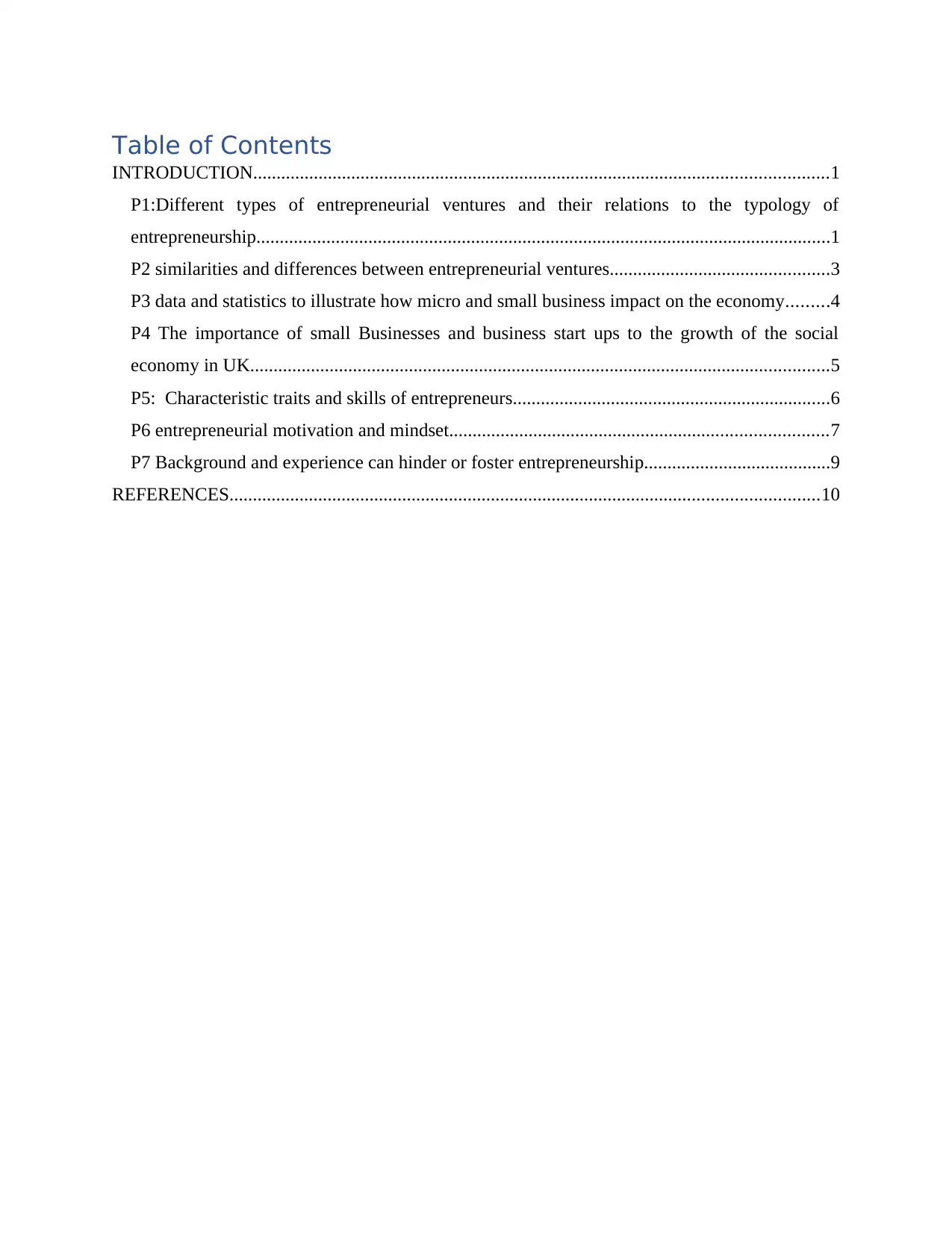
Table of Contents
INTRODUCTION...........................................................................................................................1
P1:Different types of entrepreneurial ventures and their relations to the typology of
entrepreneurship...........................................................................................................................1
P2 similarities and differences between entrepreneurial ventures...............................................3
P3 data and statistics to illustrate how micro and small business impact on the economy.........4
P4 The importance of small Businesses and business start ups to the growth of the social
economy in UK............................................................................................................................5
P5: Characteristic traits and skills of entrepreneurs....................................................................6
P6 entrepreneurial motivation and mindset.................................................................................7
P7 Background and experience can hinder or foster entrepreneurship........................................9
REFERENCES..............................................................................................................................10
INTRODUCTION...........................................................................................................................1
P1:Different types of entrepreneurial ventures and their relations to the typology of
entrepreneurship...........................................................................................................................1
P2 similarities and differences between entrepreneurial ventures...............................................3
P3 data and statistics to illustrate how micro and small business impact on the economy.........4
P4 The importance of small Businesses and business start ups to the growth of the social
economy in UK............................................................................................................................5
P5: Characteristic traits and skills of entrepreneurs....................................................................6
P6 entrepreneurial motivation and mindset.................................................................................7
P7 Background and experience can hinder or foster entrepreneurship........................................9
REFERENCES..............................................................................................................................10
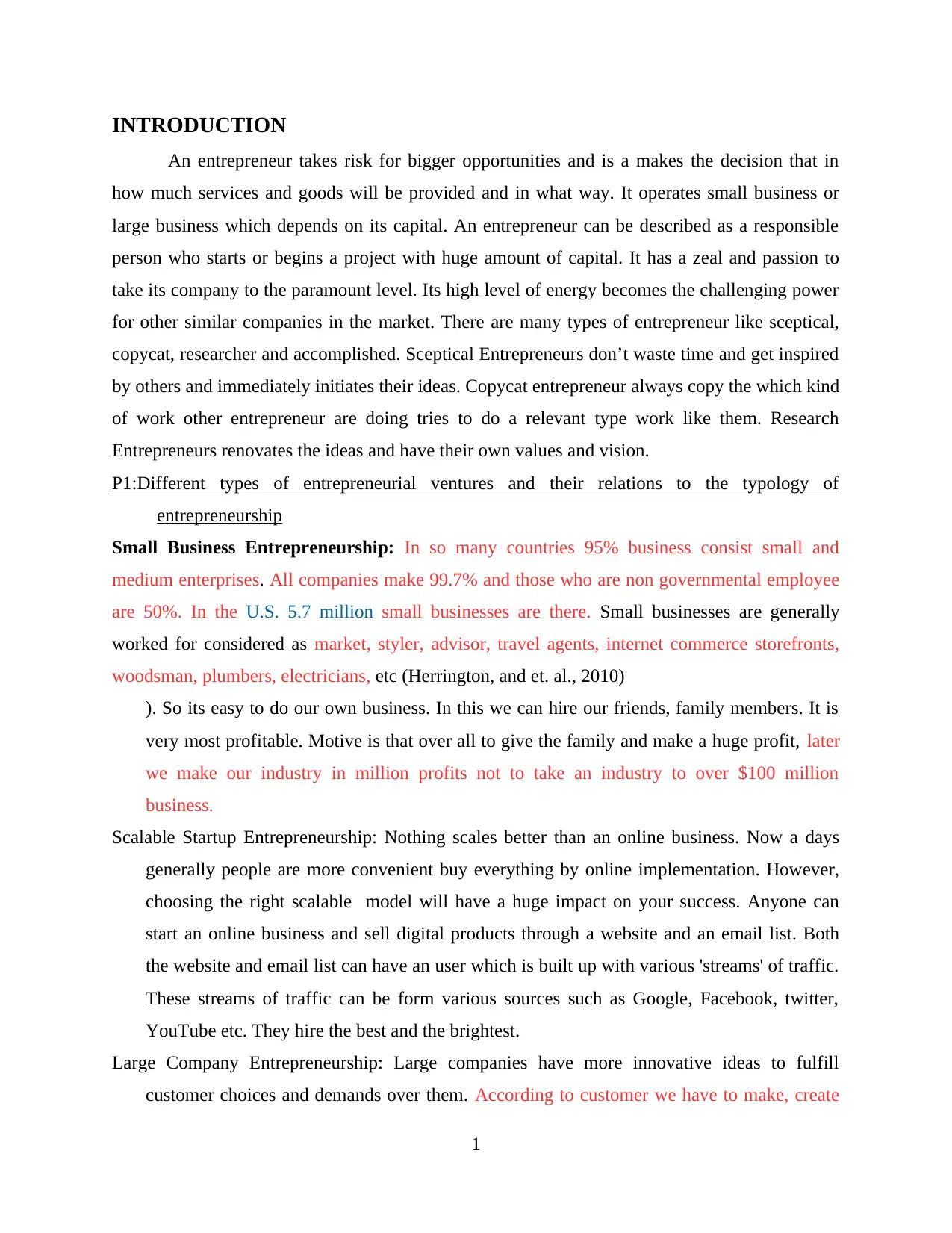
INTRODUCTION
An entrepreneur takes risk for bigger opportunities and is a makes the decision that in
how much services and goods will be provided and in what way. It operates small business or
large business which depends on its capital. An entrepreneur can be described as a responsible
person who starts or begins a project with huge amount of capital. It has a zeal and passion to
take its company to the paramount level. Its high level of energy becomes the challenging power
for other similar companies in the market. There are many types of entrepreneur like sceptical,
copycat, researcher and accomplished. Sceptical Entrepreneurs don’t waste time and get inspired
by others and immediately initiates their ideas. Copycat entrepreneur always copy the which kind
of work other entrepreneur are doing tries to do a relevant type work like them. Research
Entrepreneurs renovates the ideas and have their own values and vision.
P1:Different types of entrepreneurial ventures and their relations to the typology of
entrepreneurship
Small Business Entrepreneurship: In so many countries 95% business consist small and
medium enterprises. All companies make 99.7% and those who are non governmental employee
are 50%. In the U.S. 5.7 million small businesses are there. Small businesses are generally
worked for considered as market, styler, advisor, travel agents, internet commerce storefronts,
woodsman, plumbers, electricians, etc (Herrington, and et. al., 2010)
). So its easy to do our own business. In this we can hire our friends, family members. It is
very most profitable. Motive is that over all to give the family and make a huge profit, later
we make our industry in million profits not to take an industry to over $100 million
business.
Scalable Startup Entrepreneurship: Nothing scales better than an online business. Now a days
generally people are more convenient buy everything by online implementation. However,
choosing the right scalable model will have a huge impact on your success. Anyone can
start an online business and sell digital products through a website and an email list. Both
the website and email list can have an user which is built up with various 'streams' of traffic.
These streams of traffic can be form various sources such as Google, Facebook, twitter,
YouTube etc. They hire the best and the brightest.
Large Company Entrepreneurship: Large companies have more innovative ideas to fulfill
customer choices and demands over them. According to customer we have to make, create
1
An entrepreneur takes risk for bigger opportunities and is a makes the decision that in
how much services and goods will be provided and in what way. It operates small business or
large business which depends on its capital. An entrepreneur can be described as a responsible
person who starts or begins a project with huge amount of capital. It has a zeal and passion to
take its company to the paramount level. Its high level of energy becomes the challenging power
for other similar companies in the market. There are many types of entrepreneur like sceptical,
copycat, researcher and accomplished. Sceptical Entrepreneurs don’t waste time and get inspired
by others and immediately initiates their ideas. Copycat entrepreneur always copy the which kind
of work other entrepreneur are doing tries to do a relevant type work like them. Research
Entrepreneurs renovates the ideas and have their own values and vision.
P1:Different types of entrepreneurial ventures and their relations to the typology of
entrepreneurship
Small Business Entrepreneurship: In so many countries 95% business consist small and
medium enterprises. All companies make 99.7% and those who are non governmental employee
are 50%. In the U.S. 5.7 million small businesses are there. Small businesses are generally
worked for considered as market, styler, advisor, travel agents, internet commerce storefronts,
woodsman, plumbers, electricians, etc (Herrington, and et. al., 2010)
). So its easy to do our own business. In this we can hire our friends, family members. It is
very most profitable. Motive is that over all to give the family and make a huge profit, later
we make our industry in million profits not to take an industry to over $100 million
business.
Scalable Startup Entrepreneurship: Nothing scales better than an online business. Now a days
generally people are more convenient buy everything by online implementation. However,
choosing the right scalable model will have a huge impact on your success. Anyone can
start an online business and sell digital products through a website and an email list. Both
the website and email list can have an user which is built up with various 'streams' of traffic.
These streams of traffic can be form various sources such as Google, Facebook, twitter,
YouTube etc. They hire the best and the brightest.
Large Company Entrepreneurship: Large companies have more innovative ideas to fulfill
customer choices and demands over them. According to customer we have to make, create
1
⊘ This is a preview!⊘
Do you want full access?
Subscribe today to unlock all pages.

Trusted by 1+ million students worldwide
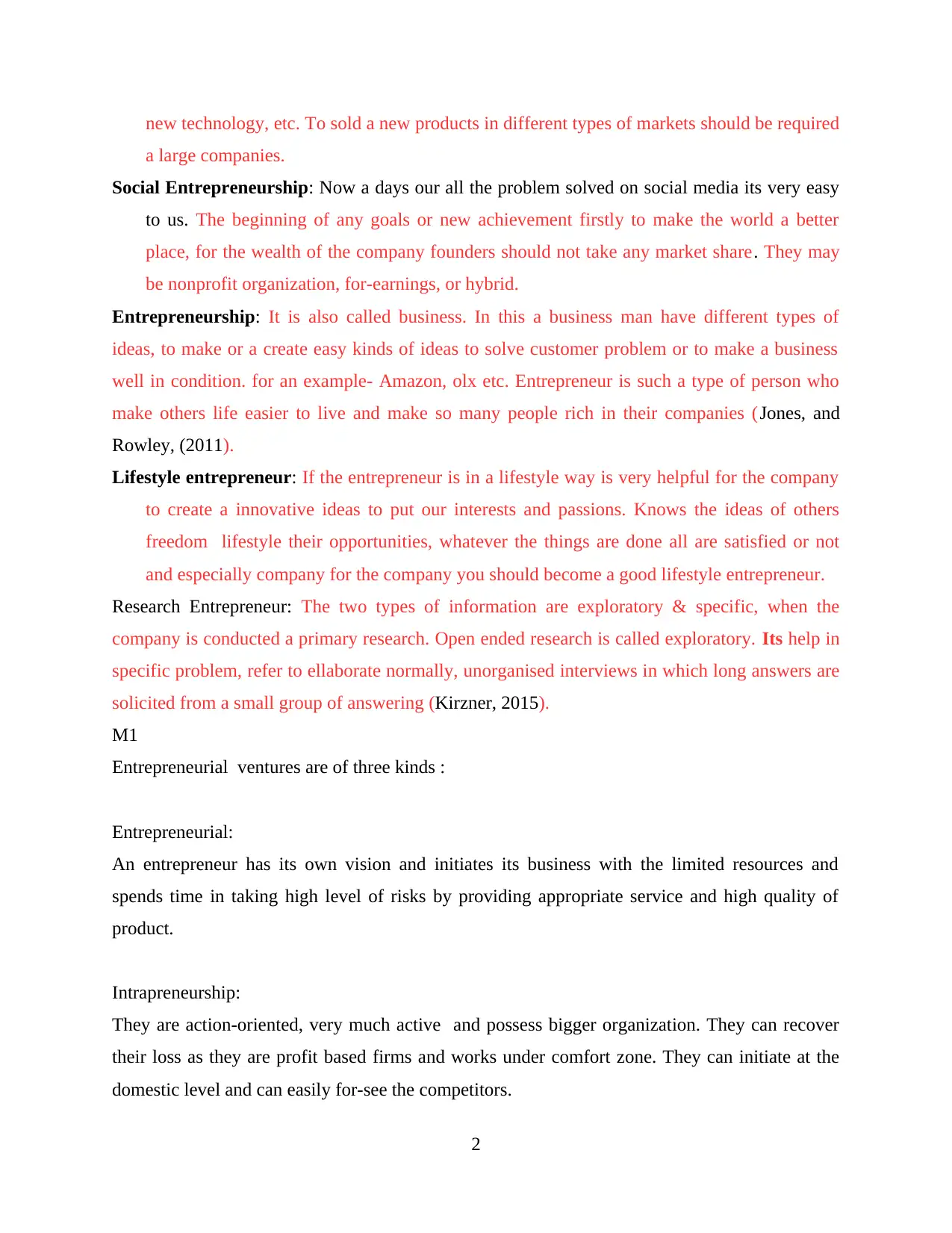
new technology, etc. To sold a new products in different types of markets should be required
a large companies.
Social Entrepreneurship: Now a days our all the problem solved on social media its very easy
to us. The beginning of any goals or new achievement firstly to make the world a better
place, for the wealth of the company founders should not take any market share. They may
be nonprofit organization, for-earnings, or hybrid.
Entrepreneurship: It is also called business. In this a business man have different types of
ideas, to make or a create easy kinds of ideas to solve customer problem or to make a business
well in condition. for an example- Amazon, olx etc. Entrepreneur is such a type of person who
make others life easier to live and make so many people rich in their companies (Jones, and
Rowley, (2011).
Lifestyle entrepreneur: If the entrepreneur is in a lifestyle way is very helpful for the company
to create a innovative ideas to put our interests and passions. Knows the ideas of others
freedom lifestyle their opportunities, whatever the things are done all are satisfied or not
and especially company for the company you should become a good lifestyle entrepreneur.
Research Entrepreneur: The two types of information are exploratory & specific, when the
company is conducted a primary research. Open ended research is called exploratory. Its help in
specific problem, refer to ellaborate normally, unorganised interviews in which long answers are
solicited from a small group of answering (Kirzner, 2015).
M1
Entrepreneurial ventures are of three kinds :
Entrepreneurial:
An entrepreneur has its own vision and initiates its business with the limited resources and
spends time in taking high level of risks by providing appropriate service and high quality of
product.
Intrapreneurship:
They are action-oriented, very much active and possess bigger organization. They can recover
their loss as they are profit based firms and works under comfort zone. They can initiate at the
domestic level and can easily for-see the competitors.
2
a large companies.
Social Entrepreneurship: Now a days our all the problem solved on social media its very easy
to us. The beginning of any goals or new achievement firstly to make the world a better
place, for the wealth of the company founders should not take any market share. They may
be nonprofit organization, for-earnings, or hybrid.
Entrepreneurship: It is also called business. In this a business man have different types of
ideas, to make or a create easy kinds of ideas to solve customer problem or to make a business
well in condition. for an example- Amazon, olx etc. Entrepreneur is such a type of person who
make others life easier to live and make so many people rich in their companies (Jones, and
Rowley, (2011).
Lifestyle entrepreneur: If the entrepreneur is in a lifestyle way is very helpful for the company
to create a innovative ideas to put our interests and passions. Knows the ideas of others
freedom lifestyle their opportunities, whatever the things are done all are satisfied or not
and especially company for the company you should become a good lifestyle entrepreneur.
Research Entrepreneur: The two types of information are exploratory & specific, when the
company is conducted a primary research. Open ended research is called exploratory. Its help in
specific problem, refer to ellaborate normally, unorganised interviews in which long answers are
solicited from a small group of answering (Kirzner, 2015).
M1
Entrepreneurial ventures are of three kinds :
Entrepreneurial:
An entrepreneur has its own vision and initiates its business with the limited resources and
spends time in taking high level of risks by providing appropriate service and high quality of
product.
Intrapreneurship:
They are action-oriented, very much active and possess bigger organization. They can recover
their loss as they are profit based firms and works under comfort zone. They can initiate at the
domestic level and can easily for-see the competitors.
2
Paraphrase This Document
Need a fresh take? Get an instant paraphrase of this document with our AI Paraphraser
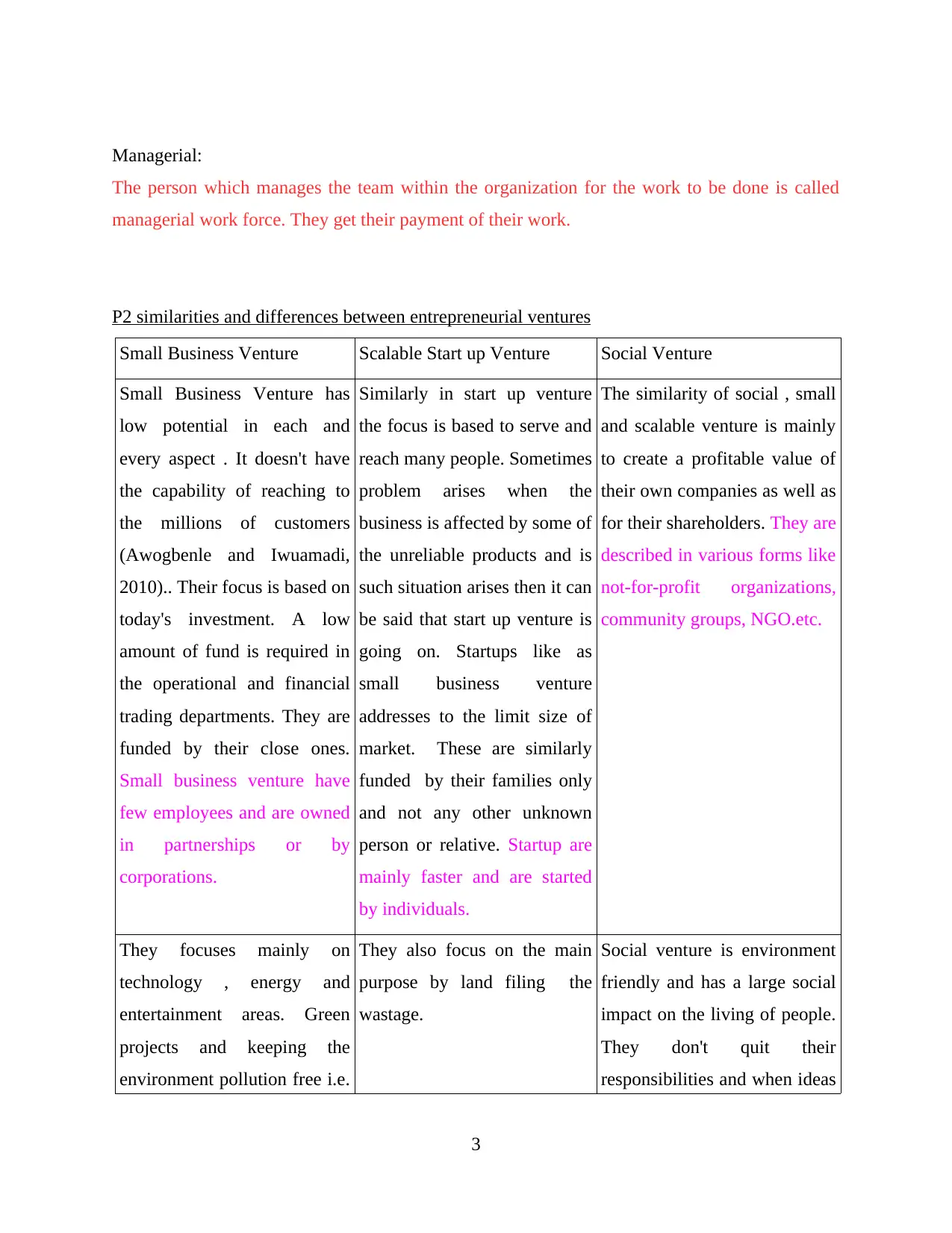
Managerial:
The person which manages the team within the organization for the work to be done is called
managerial work force. They get their payment of their work.
P2 similarities and differences between entrepreneurial ventures
Small Business Venture Scalable Start up Venture Social Venture
Small Business Venture has
low potential in each and
every aspect . It doesn't have
the capability of reaching to
the millions of customers
(Awogbenle and Iwuamadi,
2010).. Their focus is based on
today's investment. A low
amount of fund is required in
the operational and financial
trading departments. They are
funded by their close ones.
Small business venture have
few employees and are owned
in partnerships or by
corporations.
Similarly in start up venture
the focus is based to serve and
reach many people. Sometimes
problem arises when the
business is affected by some of
the unreliable products and is
such situation arises then it can
be said that start up venture is
going on. Startups like as
small business venture
addresses to the limit size of
market. These are similarly
funded by their families only
and not any other unknown
person or relative. Startup are
mainly faster and are started
by individuals.
The similarity of social , small
and scalable venture is mainly
to create a profitable value of
their own companies as well as
for their shareholders. They are
described in various forms like
not-for-profit organizations,
community groups, NGO.etc.
They focuses mainly on
technology , energy and
entertainment areas. Green
projects and keeping the
environment pollution free i.e.
They also focus on the main
purpose by land filing the
wastage.
Social venture is environment
friendly and has a large social
impact on the living of people.
They don't quit their
responsibilities and when ideas
3
The person which manages the team within the organization for the work to be done is called
managerial work force. They get their payment of their work.
P2 similarities and differences between entrepreneurial ventures
Small Business Venture Scalable Start up Venture Social Venture
Small Business Venture has
low potential in each and
every aspect . It doesn't have
the capability of reaching to
the millions of customers
(Awogbenle and Iwuamadi,
2010).. Their focus is based on
today's investment. A low
amount of fund is required in
the operational and financial
trading departments. They are
funded by their close ones.
Small business venture have
few employees and are owned
in partnerships or by
corporations.
Similarly in start up venture
the focus is based to serve and
reach many people. Sometimes
problem arises when the
business is affected by some of
the unreliable products and is
such situation arises then it can
be said that start up venture is
going on. Startups like as
small business venture
addresses to the limit size of
market. These are similarly
funded by their families only
and not any other unknown
person or relative. Startup are
mainly faster and are started
by individuals.
The similarity of social , small
and scalable venture is mainly
to create a profitable value of
their own companies as well as
for their shareholders. They are
described in various forms like
not-for-profit organizations,
community groups, NGO.etc.
They focuses mainly on
technology , energy and
entertainment areas. Green
projects and keeping the
environment pollution free i.e.
They also focus on the main
purpose by land filing the
wastage.
Social venture is environment
friendly and has a large social
impact on the living of people.
They don't quit their
responsibilities and when ideas
3
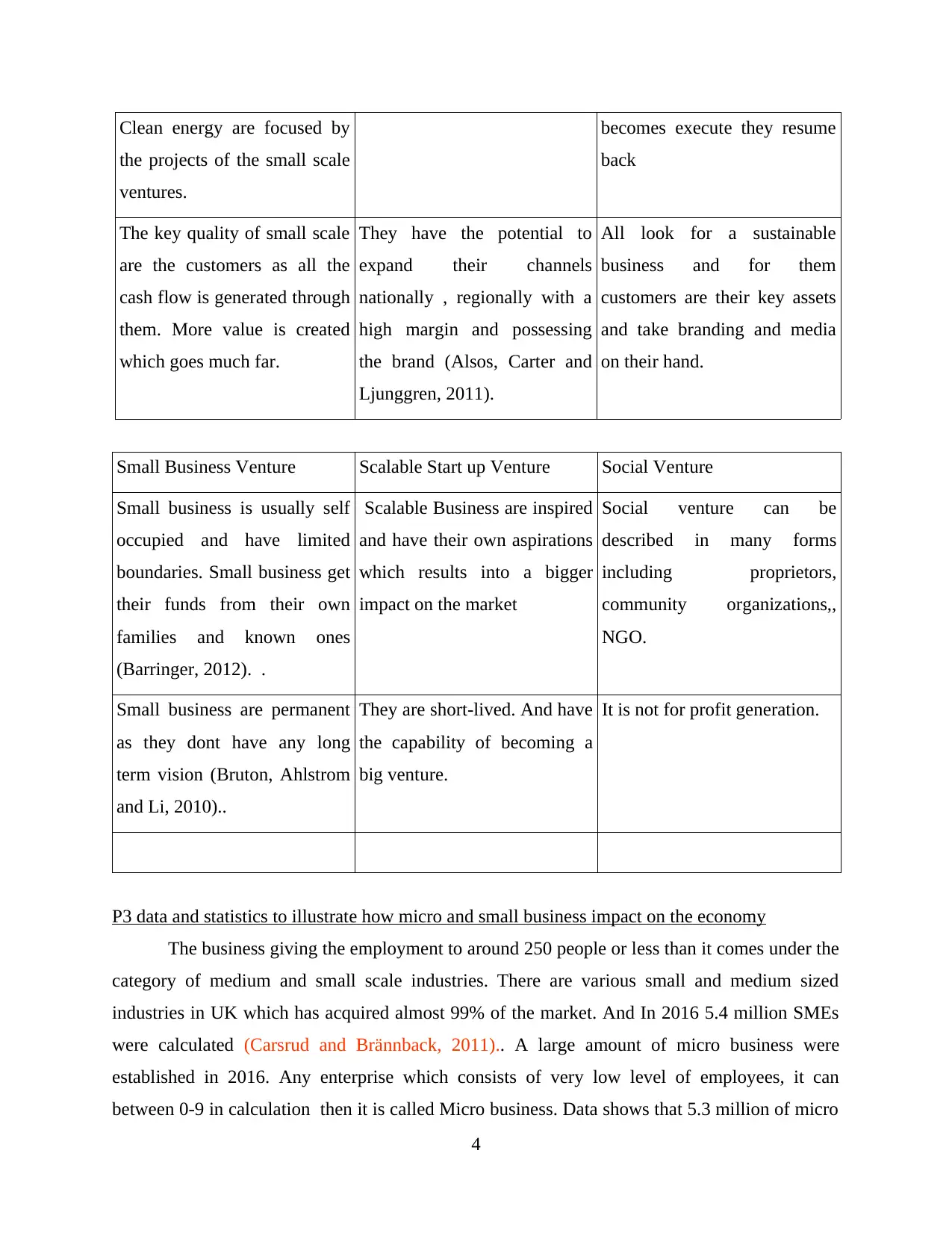
Clean energy are focused by
the projects of the small scale
ventures.
becomes execute they resume
back
The key quality of small scale
are the customers as all the
cash flow is generated through
them. More value is created
which goes much far.
They have the potential to
expand their channels
nationally , regionally with a
high margin and possessing
the brand (Alsos, Carter and
Ljunggren, 2011).
All look for a sustainable
business and for them
customers are their key assets
and take branding and media
on their hand.
Small Business Venture Scalable Start up Venture Social Venture
Small business is usually self
occupied and have limited
boundaries. Small business get
their funds from their own
families and known ones
(Barringer, 2012). .
Scalable Business are inspired
and have their own aspirations
which results into a bigger
impact on the market
Social venture can be
described in many forms
including proprietors,
community organizations,,
NGO.
Small business are permanent
as they dont have any long
term vision (Bruton, Ahlstrom
and Li, 2010)..
They are short-lived. And have
the capability of becoming a
big venture.
It is not for profit generation.
P3 data and statistics to illustrate how micro and small business impact on the economy
The business giving the employment to around 250 people or less than it comes under the
category of medium and small scale industries. There are various small and medium sized
industries in UK which has acquired almost 99% of the market. And In 2016 5.4 million SMEs
were calculated (Carsrud and Brännback, 2011).. A large amount of micro business were
established in 2016. Any enterprise which consists of very low level of employees, it can
between 0-9 in calculation then it is called Micro business. Data shows that 5.3 million of micro
4
the projects of the small scale
ventures.
becomes execute they resume
back
The key quality of small scale
are the customers as all the
cash flow is generated through
them. More value is created
which goes much far.
They have the potential to
expand their channels
nationally , regionally with a
high margin and possessing
the brand (Alsos, Carter and
Ljunggren, 2011).
All look for a sustainable
business and for them
customers are their key assets
and take branding and media
on their hand.
Small Business Venture Scalable Start up Venture Social Venture
Small business is usually self
occupied and have limited
boundaries. Small business get
their funds from their own
families and known ones
(Barringer, 2012). .
Scalable Business are inspired
and have their own aspirations
which results into a bigger
impact on the market
Social venture can be
described in many forms
including proprietors,
community organizations,,
NGO.
Small business are permanent
as they dont have any long
term vision (Bruton, Ahlstrom
and Li, 2010)..
They are short-lived. And have
the capability of becoming a
big venture.
It is not for profit generation.
P3 data and statistics to illustrate how micro and small business impact on the economy
The business giving the employment to around 250 people or less than it comes under the
category of medium and small scale industries. There are various small and medium sized
industries in UK which has acquired almost 99% of the market. And In 2016 5.4 million SMEs
were calculated (Carsrud and Brännback, 2011).. A large amount of micro business were
established in 2016. Any enterprise which consists of very low level of employees, it can
between 0-9 in calculation then it is called Micro business. Data shows that 5.3 million of micro
4
⊘ This is a preview!⊘
Do you want full access?
Subscribe today to unlock all pages.

Trusted by 1+ million students worldwide
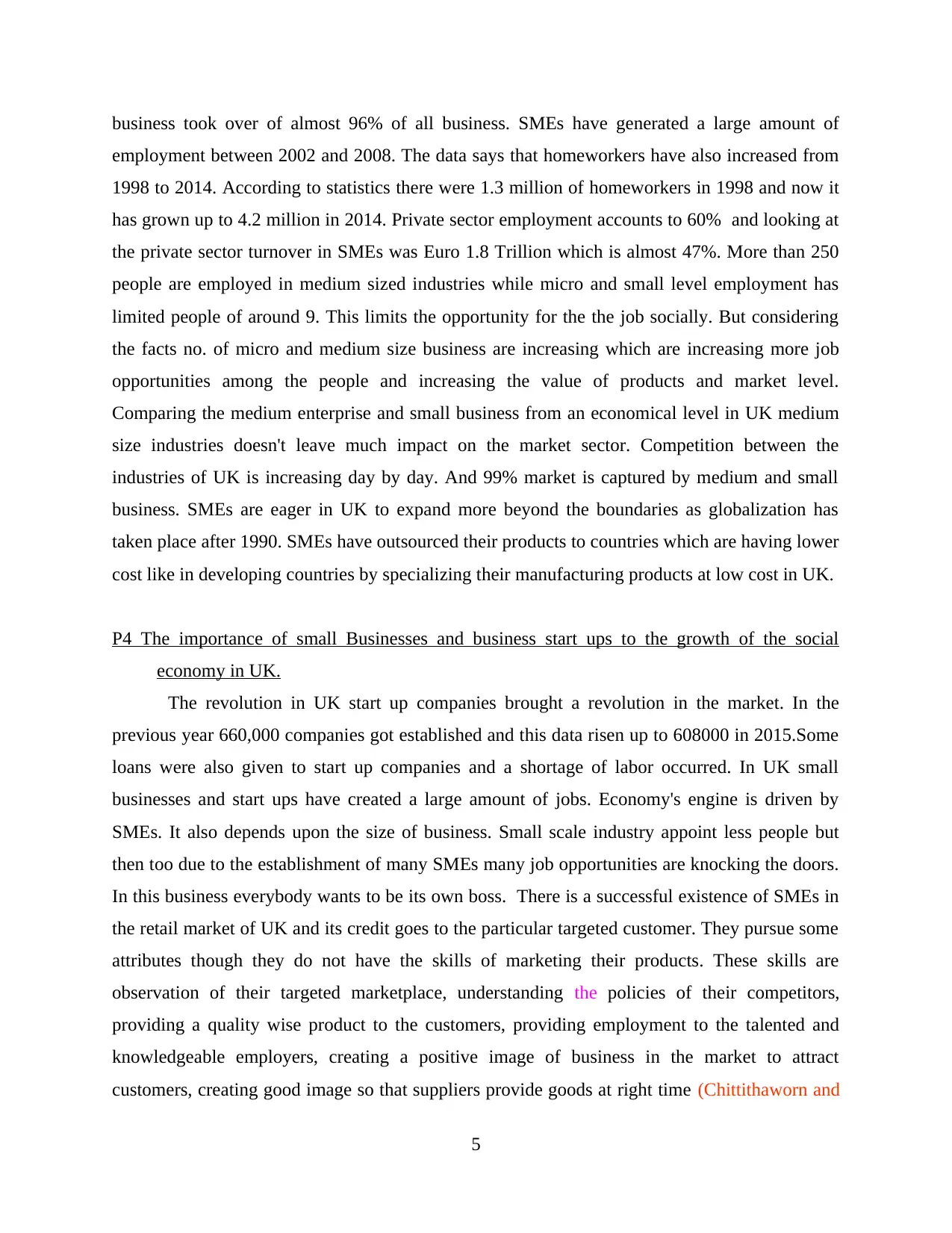
business took over of almost 96% of all business. SMEs have generated a large amount of
employment between 2002 and 2008. The data says that homeworkers have also increased from
1998 to 2014. According to statistics there were 1.3 million of homeworkers in 1998 and now it
has grown up to 4.2 million in 2014. Private sector employment accounts to 60% and looking at
the private sector turnover in SMEs was Euro 1.8 Trillion which is almost 47%. More than 250
people are employed in medium sized industries while micro and small level employment has
limited people of around 9. This limits the opportunity for the the job socially. But considering
the facts no. of micro and medium size business are increasing which are increasing more job
opportunities among the people and increasing the value of products and market level.
Comparing the medium enterprise and small business from an economical level in UK medium
size industries doesn't leave much impact on the market sector. Competition between the
industries of UK is increasing day by day. And 99% market is captured by medium and small
business. SMEs are eager in UK to expand more beyond the boundaries as globalization has
taken place after 1990. SMEs have outsourced their products to countries which are having lower
cost like in developing countries by specializing their manufacturing products at low cost in UK.
P4 The importance of small Businesses and business start ups to the growth of the social
economy in UK.
The revolution in UK start up companies brought a revolution in the market. In the
previous year 660,000 companies got established and this data risen up to 608000 in 2015.Some
loans were also given to start up companies and a shortage of labor occurred. In UK small
businesses and start ups have created a large amount of jobs. Economy's engine is driven by
SMEs. It also depends upon the size of business. Small scale industry appoint less people but
then too due to the establishment of many SMEs many job opportunities are knocking the doors.
In this business everybody wants to be its own boss. There is a successful existence of SMEs in
the retail market of UK and its credit goes to the particular targeted customer. They pursue some
attributes though they do not have the skills of marketing their products. These skills are
observation of their targeted marketplace, understanding the policies of their competitors,
providing a quality wise product to the customers, providing employment to the talented and
knowledgeable employers, creating a positive image of business in the market to attract
customers, creating good image so that suppliers provide goods at right time (Chittithaworn and
5
employment between 2002 and 2008. The data says that homeworkers have also increased from
1998 to 2014. According to statistics there were 1.3 million of homeworkers in 1998 and now it
has grown up to 4.2 million in 2014. Private sector employment accounts to 60% and looking at
the private sector turnover in SMEs was Euro 1.8 Trillion which is almost 47%. More than 250
people are employed in medium sized industries while micro and small level employment has
limited people of around 9. This limits the opportunity for the the job socially. But considering
the facts no. of micro and medium size business are increasing which are increasing more job
opportunities among the people and increasing the value of products and market level.
Comparing the medium enterprise and small business from an economical level in UK medium
size industries doesn't leave much impact on the market sector. Competition between the
industries of UK is increasing day by day. And 99% market is captured by medium and small
business. SMEs are eager in UK to expand more beyond the boundaries as globalization has
taken place after 1990. SMEs have outsourced their products to countries which are having lower
cost like in developing countries by specializing their manufacturing products at low cost in UK.
P4 The importance of small Businesses and business start ups to the growth of the social
economy in UK.
The revolution in UK start up companies brought a revolution in the market. In the
previous year 660,000 companies got established and this data risen up to 608000 in 2015.Some
loans were also given to start up companies and a shortage of labor occurred. In UK small
businesses and start ups have created a large amount of jobs. Economy's engine is driven by
SMEs. It also depends upon the size of business. Small scale industry appoint less people but
then too due to the establishment of many SMEs many job opportunities are knocking the doors.
In this business everybody wants to be its own boss. There is a successful existence of SMEs in
the retail market of UK and its credit goes to the particular targeted customer. They pursue some
attributes though they do not have the skills of marketing their products. These skills are
observation of their targeted marketplace, understanding the policies of their competitors,
providing a quality wise product to the customers, providing employment to the talented and
knowledgeable employers, creating a positive image of business in the market to attract
customers, creating good image so that suppliers provide goods at right time (Chittithaworn and
5
Paraphrase This Document
Need a fresh take? Get an instant paraphrase of this document with our AI Paraphraser
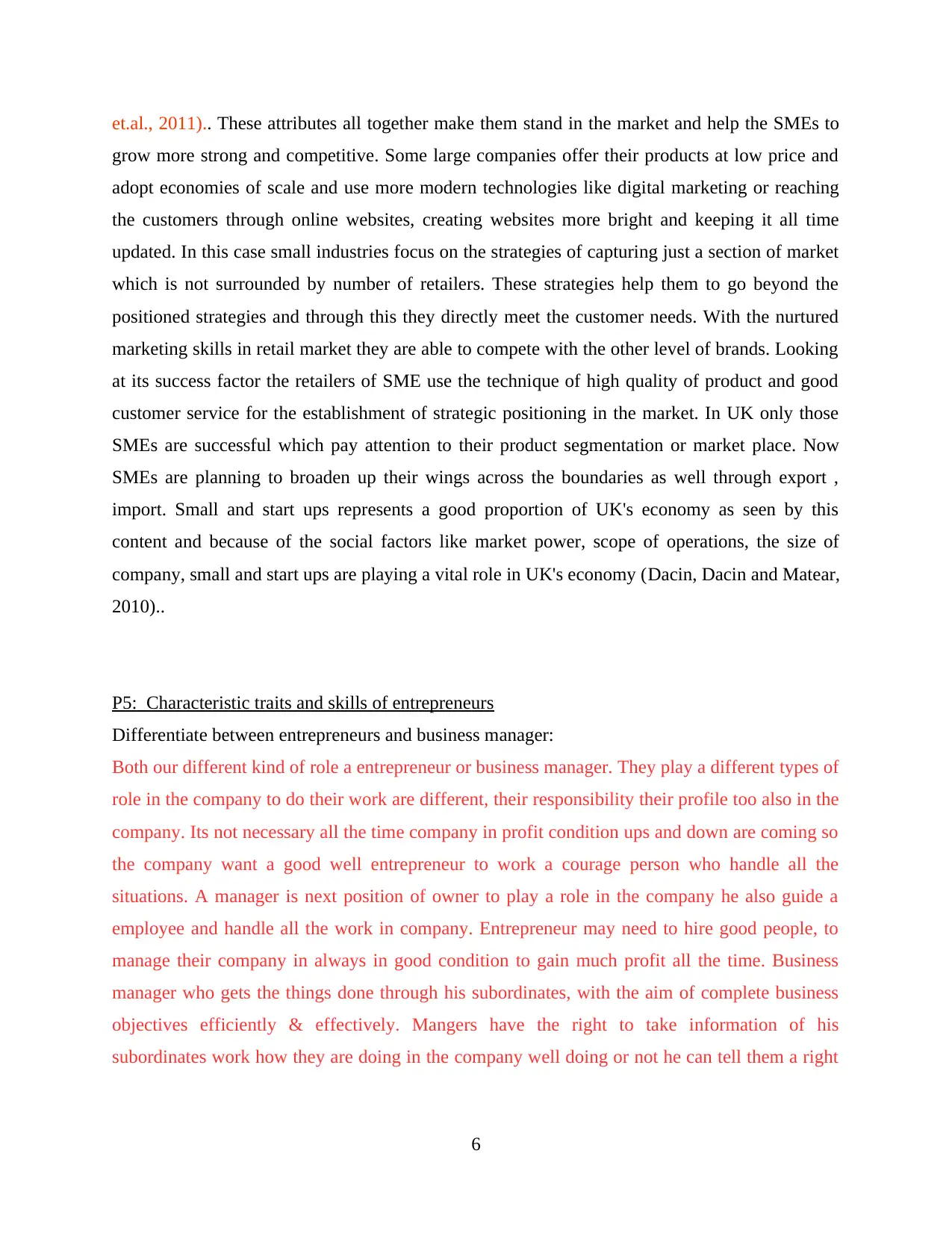
et.al., 2011).. These attributes all together make them stand in the market and help the SMEs to
grow more strong and competitive. Some large companies offer their products at low price and
adopt economies of scale and use more modern technologies like digital marketing or reaching
the customers through online websites, creating websites more bright and keeping it all time
updated. In this case small industries focus on the strategies of capturing just a section of market
which is not surrounded by number of retailers. These strategies help them to go beyond the
positioned strategies and through this they directly meet the customer needs. With the nurtured
marketing skills in retail market they are able to compete with the other level of brands. Looking
at its success factor the retailers of SME use the technique of high quality of product and good
customer service for the establishment of strategic positioning in the market. In UK only those
SMEs are successful which pay attention to their product segmentation or market place. Now
SMEs are planning to broaden up their wings across the boundaries as well through export ,
import. Small and start ups represents a good proportion of UK's economy as seen by this
content and because of the social factors like market power, scope of operations, the size of
company, small and start ups are playing a vital role in UK's economy (Dacin, Dacin and Matear,
2010)..
P5: Characteristic traits and skills of entrepreneurs
Differentiate between entrepreneurs and business manager:
Both our different kind of role a entrepreneur or business manager. They play a different types of
role in the company to do their work are different, their responsibility their profile too also in the
company. Its not necessary all the time company in profit condition ups and down are coming so
the company want a good well entrepreneur to work a courage person who handle all the
situations. A manager is next position of owner to play a role in the company he also guide a
employee and handle all the work in company. Entrepreneur may need to hire good people, to
manage their company in always in good condition to gain much profit all the time. Business
manager who gets the things done through his subordinates, with the aim of complete business
objectives efficiently & effectively. Mangers have the right to take information of his
subordinates work how they are doing in the company well doing or not he can tell them a right
6
grow more strong and competitive. Some large companies offer their products at low price and
adopt economies of scale and use more modern technologies like digital marketing or reaching
the customers through online websites, creating websites more bright and keeping it all time
updated. In this case small industries focus on the strategies of capturing just a section of market
which is not surrounded by number of retailers. These strategies help them to go beyond the
positioned strategies and through this they directly meet the customer needs. With the nurtured
marketing skills in retail market they are able to compete with the other level of brands. Looking
at its success factor the retailers of SME use the technique of high quality of product and good
customer service for the establishment of strategic positioning in the market. In UK only those
SMEs are successful which pay attention to their product segmentation or market place. Now
SMEs are planning to broaden up their wings across the boundaries as well through export ,
import. Small and start ups represents a good proportion of UK's economy as seen by this
content and because of the social factors like market power, scope of operations, the size of
company, small and start ups are playing a vital role in UK's economy (Dacin, Dacin and Matear,
2010)..
P5: Characteristic traits and skills of entrepreneurs
Differentiate between entrepreneurs and business manager:
Both our different kind of role a entrepreneur or business manager. They play a different types of
role in the company to do their work are different, their responsibility their profile too also in the
company. Its not necessary all the time company in profit condition ups and down are coming so
the company want a good well entrepreneur to work a courage person who handle all the
situations. A manager is next position of owner to play a role in the company he also guide a
employee and handle all the work in company. Entrepreneur may need to hire good people, to
manage their company in always in good condition to gain much profit all the time. Business
manager who gets the things done through his subordinates, with the aim of complete business
objectives efficiently & effectively. Mangers have the right to take information of his
subordinates work how they are doing in the company well doing or not he can tell them a right
6
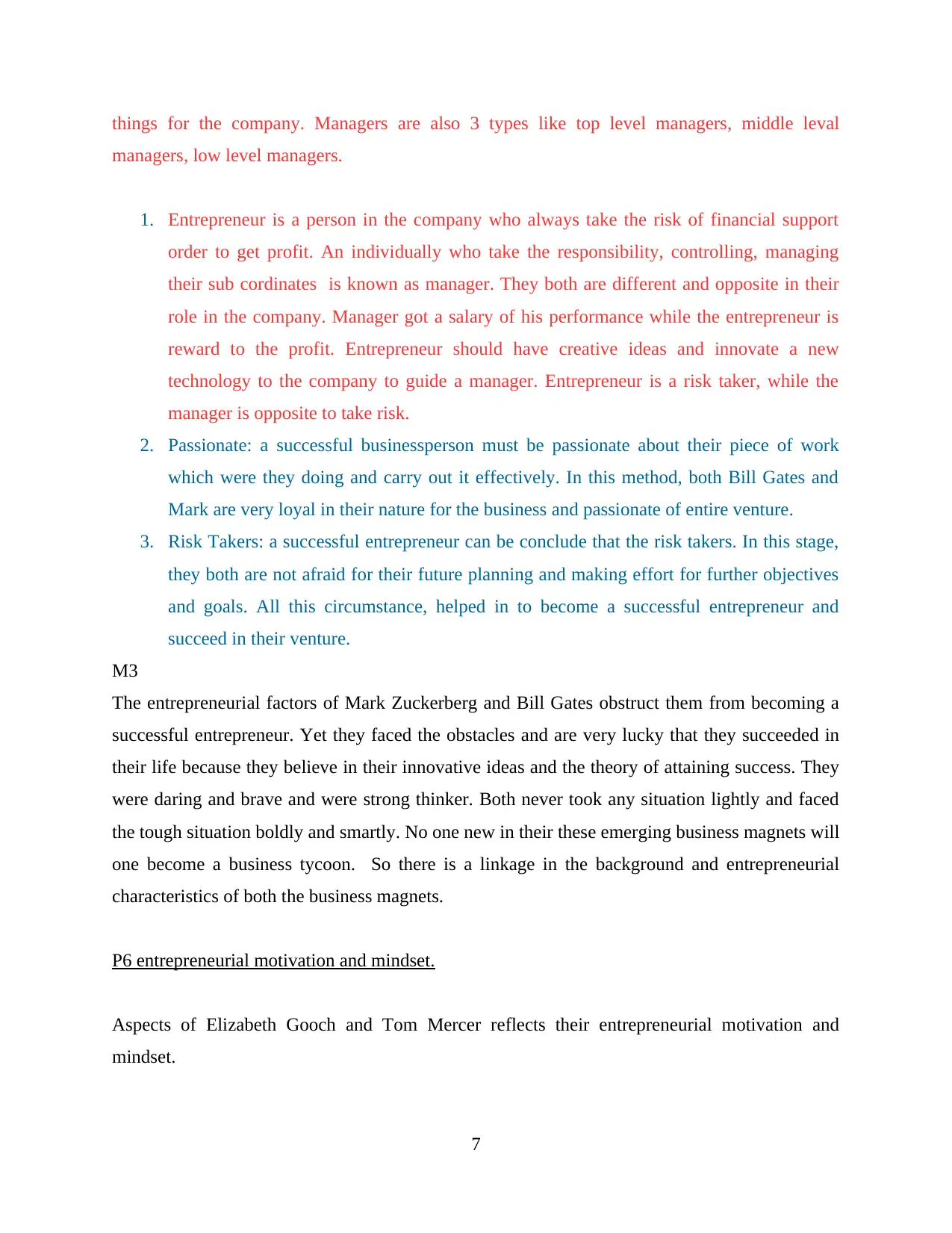
things for the company. Managers are also 3 types like top level managers, middle leval
managers, low level managers.
1. Entrepreneur is a person in the company who always take the risk of financial support
order to get profit. An individually who take the responsibility, controlling, managing
their sub cordinates is known as manager. They both are different and opposite in their
role in the company. Manager got a salary of his performance while the entrepreneur is
reward to the profit. Entrepreneur should have creative ideas and innovate a new
technology to the company to guide a manager. Entrepreneur is a risk taker, while the
manager is opposite to take risk.
2. Passionate: a successful businessperson must be passionate about their piece of work
which were they doing and carry out it effectively. In this method, both Bill Gates and
Mark are very loyal in their nature for the business and passionate of entire venture.
3. Risk Takers: a successful entrepreneur can be conclude that the risk takers. In this stage,
they both are not afraid for their future planning and making effort for further objectives
and goals. All this circumstance, helped in to become a successful entrepreneur and
succeed in their venture.
M3
The entrepreneurial factors of Mark Zuckerberg and Bill Gates obstruct them from becoming a
successful entrepreneur. Yet they faced the obstacles and are very lucky that they succeeded in
their life because they believe in their innovative ideas and the theory of attaining success. They
were daring and brave and were strong thinker. Both never took any situation lightly and faced
the tough situation boldly and smartly. No one new in their these emerging business magnets will
one become a business tycoon. So there is a linkage in the background and entrepreneurial
characteristics of both the business magnets.
P6 entrepreneurial motivation and mindset.
Aspects of Elizabeth Gooch and Tom Mercer reflects their entrepreneurial motivation and
mindset.
7
managers, low level managers.
1. Entrepreneur is a person in the company who always take the risk of financial support
order to get profit. An individually who take the responsibility, controlling, managing
their sub cordinates is known as manager. They both are different and opposite in their
role in the company. Manager got a salary of his performance while the entrepreneur is
reward to the profit. Entrepreneur should have creative ideas and innovate a new
technology to the company to guide a manager. Entrepreneur is a risk taker, while the
manager is opposite to take risk.
2. Passionate: a successful businessperson must be passionate about their piece of work
which were they doing and carry out it effectively. In this method, both Bill Gates and
Mark are very loyal in their nature for the business and passionate of entire venture.
3. Risk Takers: a successful entrepreneur can be conclude that the risk takers. In this stage,
they both are not afraid for their future planning and making effort for further objectives
and goals. All this circumstance, helped in to become a successful entrepreneur and
succeed in their venture.
M3
The entrepreneurial factors of Mark Zuckerberg and Bill Gates obstruct them from becoming a
successful entrepreneur. Yet they faced the obstacles and are very lucky that they succeeded in
their life because they believe in their innovative ideas and the theory of attaining success. They
were daring and brave and were strong thinker. Both never took any situation lightly and faced
the tough situation boldly and smartly. No one new in their these emerging business magnets will
one become a business tycoon. So there is a linkage in the background and entrepreneurial
characteristics of both the business magnets.
P6 entrepreneurial motivation and mindset.
Aspects of Elizabeth Gooch and Tom Mercer reflects their entrepreneurial motivation and
mindset.
7
⊘ This is a preview!⊘
Do you want full access?
Subscribe today to unlock all pages.

Trusted by 1+ million students worldwide
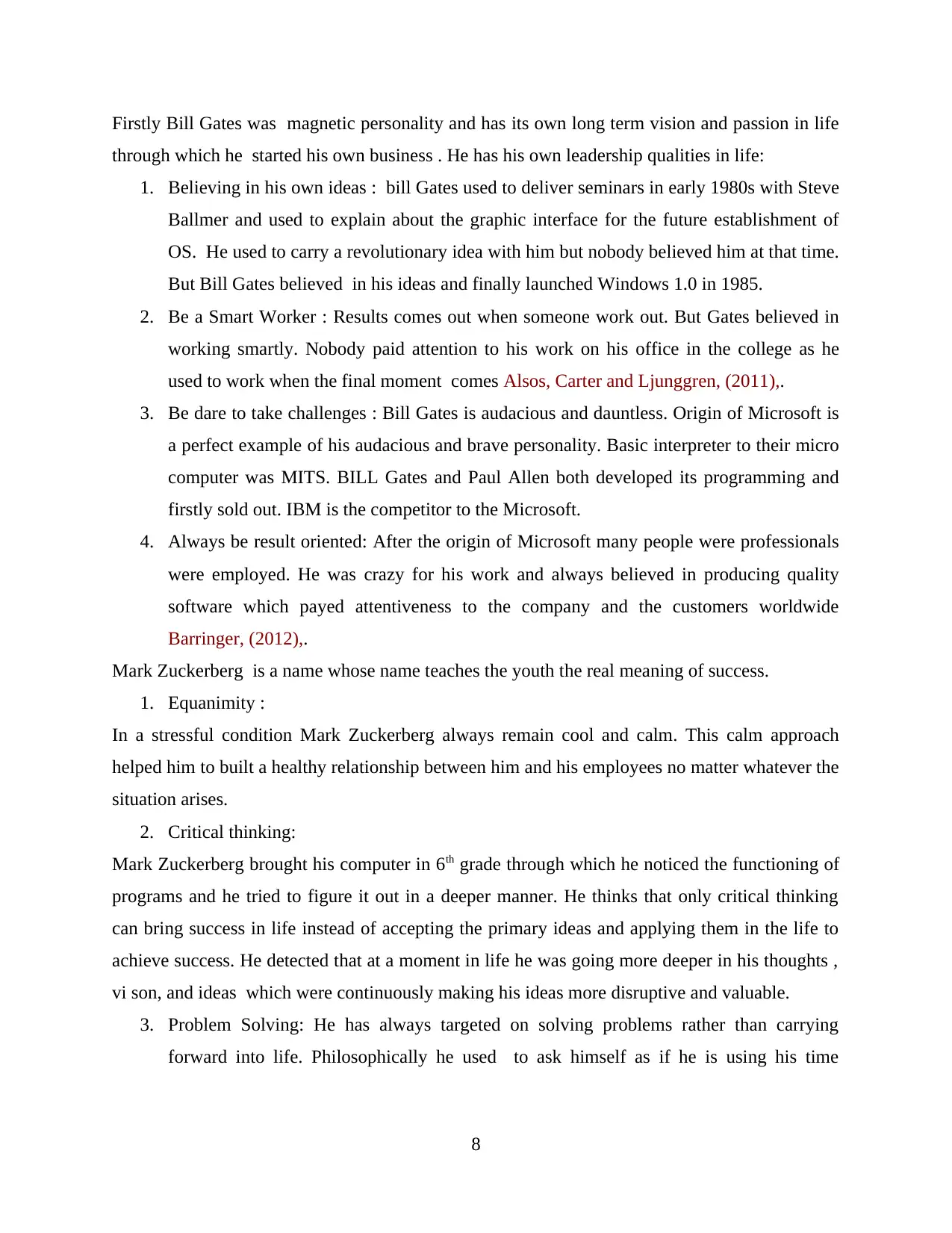
Firstly Bill Gates was magnetic personality and has its own long term vision and passion in life
through which he started his own business . He has his own leadership qualities in life:
1. Believing in his own ideas : bill Gates used to deliver seminars in early 1980s with Steve
Ballmer and used to explain about the graphic interface for the future establishment of
OS. He used to carry a revolutionary idea with him but nobody believed him at that time.
But Bill Gates believed in his ideas and finally launched Windows 1.0 in 1985.
2. Be a Smart Worker : Results comes out when someone work out. But Gates believed in
working smartly. Nobody paid attention to his work on his office in the college as he
used to work when the final moment comes Alsos, Carter and Ljunggren, (2011),.
3. Be dare to take challenges : Bill Gates is audacious and dauntless. Origin of Microsoft is
a perfect example of his audacious and brave personality. Basic interpreter to their micro
computer was MITS. BILL Gates and Paul Allen both developed its programming and
firstly sold out. IBM is the competitor to the Microsoft.
4. Always be result oriented: After the origin of Microsoft many people were professionals
were employed. He was crazy for his work and always believed in producing quality
software which payed attentiveness to the company and the customers worldwide
Barringer, (2012),.
Mark Zuckerberg is a name whose name teaches the youth the real meaning of success.
1. Equanimity :
In a stressful condition Mark Zuckerberg always remain cool and calm. This calm approach
helped him to built a healthy relationship between him and his employees no matter whatever the
situation arises.
2. Critical thinking:
Mark Zuckerberg brought his computer in 6th grade through which he noticed the functioning of
programs and he tried to figure it out in a deeper manner. He thinks that only critical thinking
can bring success in life instead of accepting the primary ideas and applying them in the life to
achieve success. He detected that at a moment in life he was going more deeper in his thoughts ,
vi son, and ideas which were continuously making his ideas more disruptive and valuable.
3. Problem Solving: He has always targeted on solving problems rather than carrying
forward into life. Philosophically he used to ask himself as if he is using his time
8
through which he started his own business . He has his own leadership qualities in life:
1. Believing in his own ideas : bill Gates used to deliver seminars in early 1980s with Steve
Ballmer and used to explain about the graphic interface for the future establishment of
OS. He used to carry a revolutionary idea with him but nobody believed him at that time.
But Bill Gates believed in his ideas and finally launched Windows 1.0 in 1985.
2. Be a Smart Worker : Results comes out when someone work out. But Gates believed in
working smartly. Nobody paid attention to his work on his office in the college as he
used to work when the final moment comes Alsos, Carter and Ljunggren, (2011),.
3. Be dare to take challenges : Bill Gates is audacious and dauntless. Origin of Microsoft is
a perfect example of his audacious and brave personality. Basic interpreter to their micro
computer was MITS. BILL Gates and Paul Allen both developed its programming and
firstly sold out. IBM is the competitor to the Microsoft.
4. Always be result oriented: After the origin of Microsoft many people were professionals
were employed. He was crazy for his work and always believed in producing quality
software which payed attentiveness to the company and the customers worldwide
Barringer, (2012),.
Mark Zuckerberg is a name whose name teaches the youth the real meaning of success.
1. Equanimity :
In a stressful condition Mark Zuckerberg always remain cool and calm. This calm approach
helped him to built a healthy relationship between him and his employees no matter whatever the
situation arises.
2. Critical thinking:
Mark Zuckerberg brought his computer in 6th grade through which he noticed the functioning of
programs and he tried to figure it out in a deeper manner. He thinks that only critical thinking
can bring success in life instead of accepting the primary ideas and applying them in the life to
achieve success. He detected that at a moment in life he was going more deeper in his thoughts ,
vi son, and ideas which were continuously making his ideas more disruptive and valuable.
3. Problem Solving: He has always targeted on solving problems rather than carrying
forward into life. Philosophically he used to ask himself as if he is using his time
8
Paraphrase This Document
Need a fresh take? Get an instant paraphrase of this document with our AI Paraphraser
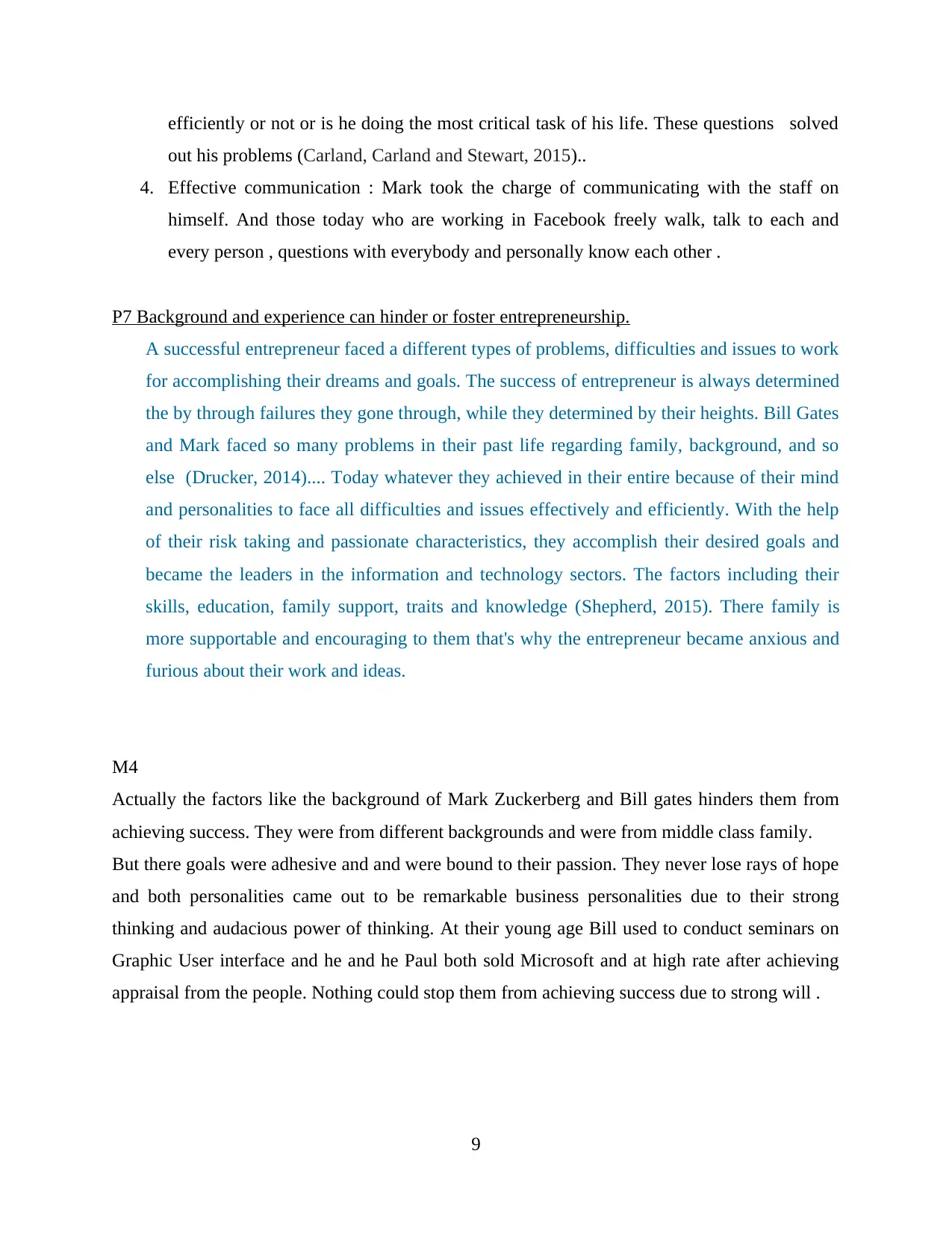
efficiently or not or is he doing the most critical task of his life. These questions solved
out his problems (Carland, Carland and Stewart, 2015)..
4. Effective communication : Mark took the charge of communicating with the staff on
himself. And those today who are working in Facebook freely walk, talk to each and
every person , questions with everybody and personally know each other .
P7 Background and experience can hinder or foster entrepreneurship.
A successful entrepreneur faced a different types of problems, difficulties and issues to work
for accomplishing their dreams and goals. The success of entrepreneur is always determined
the by through failures they gone through, while they determined by their heights. Bill Gates
and Mark faced so many problems in their past life regarding family, background, and so
else (Drucker, 2014).... Today whatever they achieved in their entire because of their mind
and personalities to face all difficulties and issues effectively and efficiently. With the help
of their risk taking and passionate characteristics, they accomplish their desired goals and
became the leaders in the information and technology sectors. The factors including their
skills, education, family support, traits and knowledge (Shepherd, 2015). There family is
more supportable and encouraging to them that's why the entrepreneur became anxious and
furious about their work and ideas.
M4
Actually the factors like the background of Mark Zuckerberg and Bill gates hinders them from
achieving success. They were from different backgrounds and were from middle class family.
But there goals were adhesive and and were bound to their passion. They never lose rays of hope
and both personalities came out to be remarkable business personalities due to their strong
thinking and audacious power of thinking. At their young age Bill used to conduct seminars on
Graphic User interface and he and he Paul both sold Microsoft and at high rate after achieving
appraisal from the people. Nothing could stop them from achieving success due to strong will .
9
out his problems (Carland, Carland and Stewart, 2015)..
4. Effective communication : Mark took the charge of communicating with the staff on
himself. And those today who are working in Facebook freely walk, talk to each and
every person , questions with everybody and personally know each other .
P7 Background and experience can hinder or foster entrepreneurship.
A successful entrepreneur faced a different types of problems, difficulties and issues to work
for accomplishing their dreams and goals. The success of entrepreneur is always determined
the by through failures they gone through, while they determined by their heights. Bill Gates
and Mark faced so many problems in their past life regarding family, background, and so
else (Drucker, 2014).... Today whatever they achieved in their entire because of their mind
and personalities to face all difficulties and issues effectively and efficiently. With the help
of their risk taking and passionate characteristics, they accomplish their desired goals and
became the leaders in the information and technology sectors. The factors including their
skills, education, family support, traits and knowledge (Shepherd, 2015). There family is
more supportable and encouraging to them that's why the entrepreneur became anxious and
furious about their work and ideas.
M4
Actually the factors like the background of Mark Zuckerberg and Bill gates hinders them from
achieving success. They were from different backgrounds and were from middle class family.
But there goals were adhesive and and were bound to their passion. They never lose rays of hope
and both personalities came out to be remarkable business personalities due to their strong
thinking and audacious power of thinking. At their young age Bill used to conduct seminars on
Graphic User interface and he and he Paul both sold Microsoft and at high rate after achieving
appraisal from the people. Nothing could stop them from achieving success due to strong will .
9
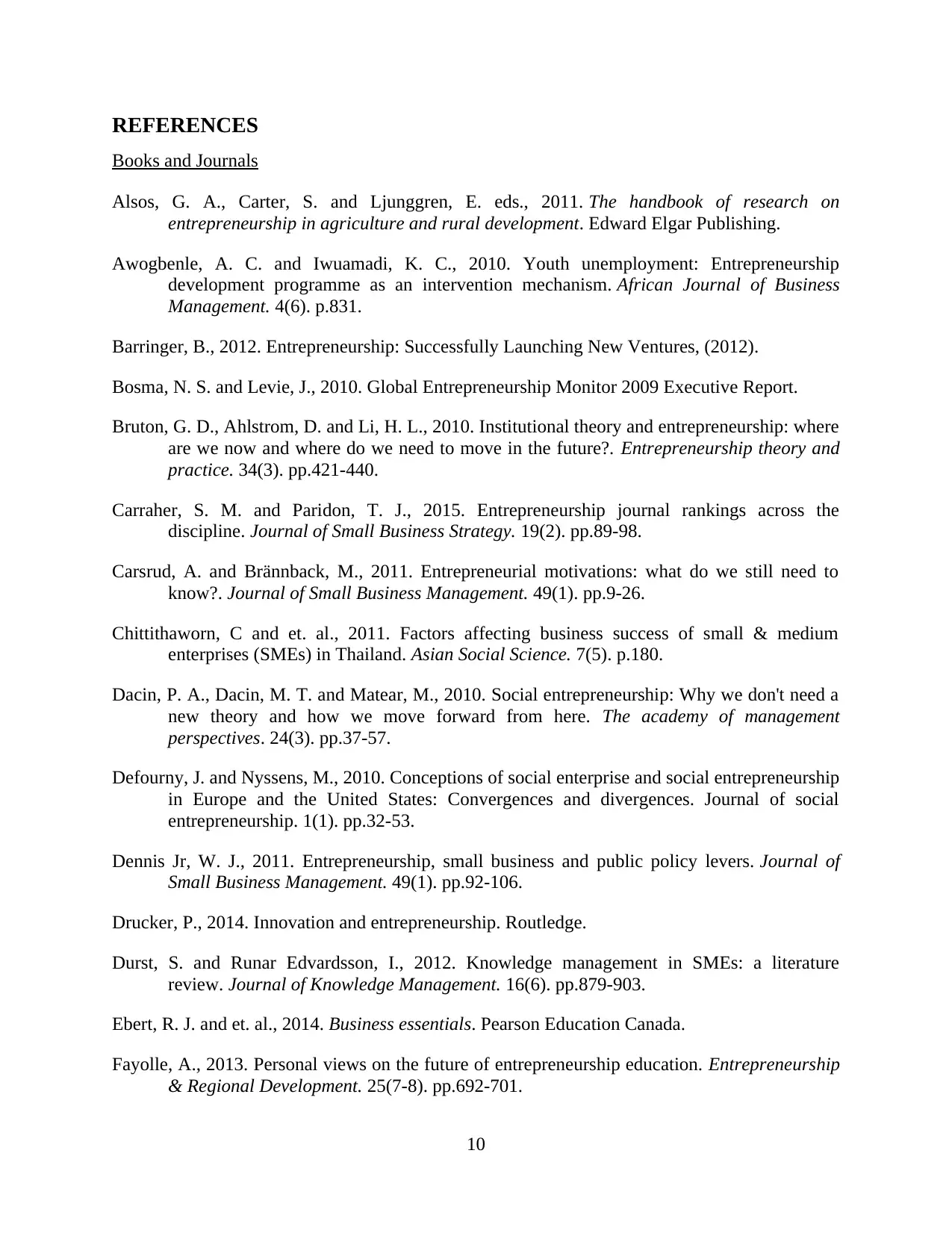
REFERENCES
Books and Journals
Alsos, G. A., Carter, S. and Ljunggren, E. eds., 2011. The handbook of research on
entrepreneurship in agriculture and rural development. Edward Elgar Publishing.
Awogbenle, A. C. and Iwuamadi, K. C., 2010. Youth unemployment: Entrepreneurship
development programme as an intervention mechanism. African Journal of Business
Management. 4(6). p.831.
Barringer, B., 2012. Entrepreneurship: Successfully Launching New Ventures, (2012).
Bosma, N. S. and Levie, J., 2010. Global Entrepreneurship Monitor 2009 Executive Report.
Bruton, G. D., Ahlstrom, D. and Li, H. L., 2010. Institutional theory and entrepreneurship: where
are we now and where do we need to move in the future?. Entrepreneurship theory and
practice. 34(3). pp.421-440.
Carraher, S. M. and Paridon, T. J., 2015. Entrepreneurship journal rankings across the
discipline. Journal of Small Business Strategy. 19(2). pp.89-98.
Carsrud, A. and Brännback, M., 2011. Entrepreneurial motivations: what do we still need to
know?. Journal of Small Business Management. 49(1). pp.9-26.
Chittithaworn, C and et. al., 2011. Factors affecting business success of small & medium
enterprises (SMEs) in Thailand. Asian Social Science. 7(5). p.180.
Dacin, P. A., Dacin, M. T. and Matear, M., 2010. Social entrepreneurship: Why we don't need a
new theory and how we move forward from here. The academy of management
perspectives. 24(3). pp.37-57.
Defourny, J. and Nyssens, M., 2010. Conceptions of social enterprise and social entrepreneurship
in Europe and the United States: Convergences and divergences. Journal of social
entrepreneurship. 1(1). pp.32-53.
Dennis Jr, W. J., 2011. Entrepreneurship, small business and public policy levers. Journal of
Small Business Management. 49(1). pp.92-106.
Drucker, P., 2014. Innovation and entrepreneurship. Routledge.
Durst, S. and Runar Edvardsson, I., 2012. Knowledge management in SMEs: a literature
review. Journal of Knowledge Management. 16(6). pp.879-903.
Ebert, R. J. and et. al., 2014. Business essentials. Pearson Education Canada.
Fayolle, A., 2013. Personal views on the future of entrepreneurship education. Entrepreneurship
& Regional Development. 25(7-8). pp.692-701.
10
Books and Journals
Alsos, G. A., Carter, S. and Ljunggren, E. eds., 2011. The handbook of research on
entrepreneurship in agriculture and rural development. Edward Elgar Publishing.
Awogbenle, A. C. and Iwuamadi, K. C., 2010. Youth unemployment: Entrepreneurship
development programme as an intervention mechanism. African Journal of Business
Management. 4(6). p.831.
Barringer, B., 2012. Entrepreneurship: Successfully Launching New Ventures, (2012).
Bosma, N. S. and Levie, J., 2010. Global Entrepreneurship Monitor 2009 Executive Report.
Bruton, G. D., Ahlstrom, D. and Li, H. L., 2010. Institutional theory and entrepreneurship: where
are we now and where do we need to move in the future?. Entrepreneurship theory and
practice. 34(3). pp.421-440.
Carraher, S. M. and Paridon, T. J., 2015. Entrepreneurship journal rankings across the
discipline. Journal of Small Business Strategy. 19(2). pp.89-98.
Carsrud, A. and Brännback, M., 2011. Entrepreneurial motivations: what do we still need to
know?. Journal of Small Business Management. 49(1). pp.9-26.
Chittithaworn, C and et. al., 2011. Factors affecting business success of small & medium
enterprises (SMEs) in Thailand. Asian Social Science. 7(5). p.180.
Dacin, P. A., Dacin, M. T. and Matear, M., 2010. Social entrepreneurship: Why we don't need a
new theory and how we move forward from here. The academy of management
perspectives. 24(3). pp.37-57.
Defourny, J. and Nyssens, M., 2010. Conceptions of social enterprise and social entrepreneurship
in Europe and the United States: Convergences and divergences. Journal of social
entrepreneurship. 1(1). pp.32-53.
Dennis Jr, W. J., 2011. Entrepreneurship, small business and public policy levers. Journal of
Small Business Management. 49(1). pp.92-106.
Drucker, P., 2014. Innovation and entrepreneurship. Routledge.
Durst, S. and Runar Edvardsson, I., 2012. Knowledge management in SMEs: a literature
review. Journal of Knowledge Management. 16(6). pp.879-903.
Ebert, R. J. and et. al., 2014. Business essentials. Pearson Education Canada.
Fayolle, A., 2013. Personal views on the future of entrepreneurship education. Entrepreneurship
& Regional Development. 25(7-8). pp.692-701.
10
⊘ This is a preview!⊘
Do you want full access?
Subscribe today to unlock all pages.

Trusted by 1+ million students worldwide
1 out of 13
Related Documents
Your All-in-One AI-Powered Toolkit for Academic Success.
+13062052269
info@desklib.com
Available 24*7 on WhatsApp / Email
![[object Object]](/_next/static/media/star-bottom.7253800d.svg)
Unlock your academic potential
Copyright © 2020–2026 A2Z Services. All Rights Reserved. Developed and managed by ZUCOL.





